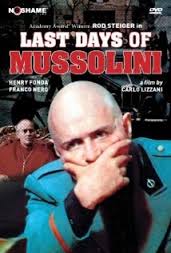
MUSSOLINI: THE LAST ACT
Italy, 1975, 125 minutes, Colour.
Rod Steiger, Franco Nero, Lisa Gastoni, Henry Fonda.
Directed by Carlo Lizzani.
Mussolini: The Last Act is an Italian production of the mid-70s. There was a preoccupation during the '70s in remembering and examining the fascist experience and World War Two. Many prominent writers and directors were involved in such films as Visconti's The Damned, Bertollucci The Conformist, and such American films as Cabaret. At the same time as this film, Ennio de Concini wrote and directed Hitler: The Last Ten Days starring Alec Guinness as Hitler. This film seems to be a companion piece. Rod Steiger takes the part of Mussolini, he appears somewhat like the dictator but the acting style is very much that of Steiger and his mannerisms. Henry Fonda has a short role as Cardinal Schuster. The film is particularly anti-Mussolini and anti-fascist and reflects the feeling of the Italian Left against the fascists and warns about future fascist government. The film has the potential for very strong drama but is a rather subdued presentation of important events in Italy's history.
1. An interesting historical drama? The entertainment value in this repicturing of history? How well did the film combine historical documentation, the dramatics of World War Two, the personal drama of Mussolini and the involvement in the war of the Italians?
2. The popularity of this kind of film in the '70s? The '70s and the interest in looking back on fascism and its various facets, World War Two?
3. The Italian production, the use of authentic newsreel material, the representation of historical events and characters, the use of Italian locations especially around Lake Como?
4. The importance of focusing on the 'last act' ? the significance of the title with Mussolini and his final hours? The various captions at beginning and end of the film? Highlighting of the tensions in the Italian people, the experience of fascist rule, the role of the partisans, the Germans and the advancing Americans? Mussolini and his impact on the Italians, participation in the war, the conduct of the war and its lack of success for the Italians? The Germans and their wanting to control Mussolini and retreat? The irony of Hitler's death at the same time? The Americans and their wanting to take Mussolini alive? How well did the film communicate these realities?
5. The picturing of the fascists and the film's critique and condemnation of them? The presentation of the partisans ? their feel for Italy, antifascist movement, their legality and taking over of government? Their treatment of the fascists? The sympathies of the film for the partisans? The role of the partisans at the end of the war? In retrospect?
6. The importance of the choice of Rod Steiger for the central role? His acting style, his being made up to look like Mussolini? How persuasive was he in his performance? The Italian stars, Franco Nero embodying Mussolini's executioner, Henry Fonda as Cardinal Schuster?
7. The film's presuppositions about World War Two and blame and involvement, Italy's role, Mussolini's decisions and motivation? The end of the war and the Italian involvement? Presuppositions in the audience of judging Mussolini, hatred of him, his treatment and its justice? The captions and the information given about him? The fact that the treatment of his body and hanging it in sham was not included in the film?
8. Mussolini and his role in Italian politics and government, his takeover, his government, his memories of the past and the importance of the flashbacks? His ego, certainties, doubts? His being beleaguered and having to cope with this? His plan for escape, his using his assistants, his escaping and evading people and issues? The fact that he had no support? His wanting to do deals with Germans, Americans? The various options he faced as he moved from Como?
9. The film's presentation of Clara Petacci? Her background, her character? The people talking about her and wanting to execute her with Mussolini? Her escape with him, her jealousies of his other women? Her loyalty, love for him, her role as his mistress? Her following him, trying to protect him, sharing his sufferings, dying with him? The screenplay's use of her as a symbol of anybody who liked and supported Mussolini?
10. The role of Cardinal Schuster? As Archbishop of Milan, his influence on Mussolini, his role in mediating, links with the partisan government, his mediation with the Americans?
11. The picture of the Americans, their role in the war, the liberation of Italy, their working from Switzerland with agents, their hopes for having Mussolini and trying him, the details of their plans?
12. The Germans and their retreat, their control over Mussolini, threatening to shoot him? Their surrendering behind his back? His escaping with them, disguised as a German and yet his disdain of them?
13. The role of the new government, their decisions, legality, judgments, condemnation of Mussolini and sending an executioner? The rights and wrongs of their stances as presented in their debates?
14. The various partisan groups, in Milan, in the countryside, their acting as judges? The feel for the partisans' attitudes of the time, their work in Dongo? Pedro and his guarding of Mussolini and his plans, not wanting him killed? Valerio and his motivations, commission by the Milanese, his hastening towards Mussolini, finding him, the actual execution?
15. The melodramatics of Mussolini's escape, with the Germans, being held up, walking about, his being caught, the cold night, his talking before his death?
16. The interspersing of the memories of Mussolini throughout the film, his role with Germans, in the war, his glories, his arrogance, his success? The ironies when it had all gone?
17. How well did the film treat themes of war, power, dictatorship, fascism? The history of Italy? The purging of ill-feeling towards fascism by such a visual presentation? A warning about future fascism?